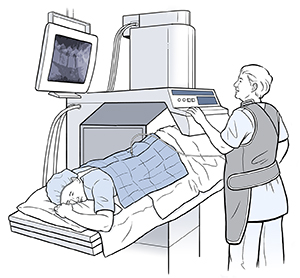A
B
C
D
E
F
G
H
I
J
K
L
M
N
O
P
Q
R
S
T
U
V
W
X
Y
Z
Back to Intro
Click a letter to see a list of medical procedures beginning with that letter.
Click 'Back to Intro' to return to the beginning of this section.
Myelogram
A myelogram is a test to check problems with your spinal canal. This includes the spinal cord, nerve roots, and spinal lining. The canal is a tunnel-like structure in your spine that surrounds your spinal cord. A myelogram uses a dye injected into the spinal canal with the guidance of imaging. The imaging is typically done by a real-time form of X-ray (called fluoroscopy). Pictures are then taken of your spinal canal.
How do you get ready for a myelogram?
-
Don’t eat the morning of the test. But you can drink water or other clear fluids.
-
If told to, stop taking medicines before the test.
-
Arrange for someone to drive you home.
What to tell the person doing your study
Tell the health care provider if you:
-
Are pregnant or think you may be pregnant.
-
Have any bleeding problems.
-
Take blood thinners (anticoagulants) or other medicines. These include aspirin, certain antipsychotic medicines, and antidepressants. You may be told to stop taking these 1 or more days before your test.
-
Have had back surgery or low back pain.
-
Have any allergies.
What happens during a myelogram?
 |
| The exam table may be tilted during the X-ray. |
-
You will change into a hospital gown.
-
Your lower back will be cleaned, covered with drapes, and injected with a numbing medicine.
-
The health care provider will use X-rays (fluoroscopy) to guide a thin needle into your spinal canal space.
-
The provider may take out a small amount of cerebrospinal fluid (CSF). The provider will inject dye (contrast fluid) into your spinal canal.
-
The table will be tilted in various directions to help move the contrast dye to different areas of your spinal canal.
-
More X-rays will be taken.
-
If you need a CT test, it will follow the X-rays.
What happens after a myelogram?
-
Take it easy for the rest of the day, as advised.
-
Don't do any physical activity or bending for 1 to 2 days after the procedure, or as directed by your doctor.
-
Lie down with your head raised if you get a headache, or if directed to do so.
-
Drink plenty of water.
-
Your doctor will discuss the test results with you at a follow-up appointment.
What are the risks of a myelogram?
-
Small risks of pain, bleeding or infection at the injection site or in or around the spinal canal
-
Headache
-
CSF leak that may need a blood patch or other treatments
-
Injury to a nerve or the spinal cord at the injection site
-
X-ray radiation exposure (generally believed to be low risk and safe)
When to contact your doctor
Contact your doctor right away if any of the following occur:
-
A headache that lasts 2 days or more
-
Fever of 100.4 °F (38°C) or above, or as directed by your doctor
-
Chills
-
Severe upset stomach or vomiting
-
Trouble urinating or having a bowel movement
-
Lasting pain in your back, or tingling in your groin or legs
-
Anything else your doctor told you to report based on your health condition
Online Medical Reviewer:
Mahammad Juber MD
Online Medical Reviewer:
Melinda Murray Ratini DO
Online Medical Reviewer:
Raymond Kent Turley BSN MSN RN
Date Last Reviewed:
5/1/2025
© 2000-2025 The StayWell Company, LLC. All rights reserved. This information is not intended as a substitute for professional medical care. Always follow your healthcare professional's instructions.